| |
SAINT PAUL WAS CONVERTED TO TRUE CHRISTIANITY ON THE DAMASCUS
ROAD IN SYRIA. HAVE YOU HAD YOUR DAMASCUS ROAD EXPERIENCE? |
|
Saul
of Tarsus—a Hebrew of the Hebrews—had a life changing encounter
with the Messiah on the Damascus Road....The only surviving, authentic,
and infallible account of his conversion is found in the New
Covenant book called The Acts of the Apostles. Unfortunately, even the Book of Acts was edited and changed by Emperor Jesus Constantine and Jerome because it is missing the final chapters in the life of the great Saint Paul.
The
2 greatest encounters between men and the Almighty was Moses meeting
The Eternal at the Burning Bush, and Saul of Tarsus meeting the Risen
Messiah on the Damascus Road.
The
first great event happened around 1537 BC., and the second divine encounter
happened around 33 AD.
Both
men were towering intellects, highly educated, prolific writers . .
. and humble....Moses established the Old Covenant Israel and
he wrote the first 5 books of the Bible—which contain the only
authentic, infallible account of the creation of the universe
and mankind.
Saint
Paul established the New Covenant Israel and wrote over 30% of the books
of the New Testament, or, as it should be called, the New Covenant:
Behold,
the days come, saith JEHOVAH, that I will make a new covenant with
the house of Israel, and with the house of Judah. Not according to
the covenant that I made with their fathers in the day that I took
them by the hand to bring them out of the land of Egypt; which my
covenant they broke, although I was an husband unto them, saith JEHOVAH(Jeremiah 31:31-32).
Both
covenants began with the Name of the Person making the covenant clearly
revealed.
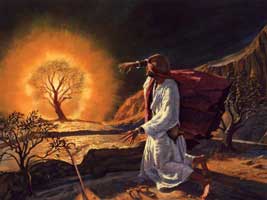
The Almighty spoke to Moses
in Hebrew at the Burning Bush. |
| |
The
encounter of Moses with JEHOVAH at the Burning Bush and
the conversion of Saul of Tarsus were life changing events.
Both
men wanted to know the Name of the Person who spoke with
him!
|
|
|
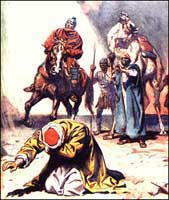
Saul fell to the ground and the
Messiah spoke to him in Hebrew. |
Moses
was very anxious to know the Name of the Person who appeared to him
at the Burning Bush. The Almighty spoke Hebrew to Moses at that epic
encounter:
And
Moses said unto Elohim, Behold, when I come unto the children of
Israel, and shall say unto them, The Elohim of your fathers hath
sent me unto you; and they shall say to me, What
is his name? what shall I say unto them? And Elohim said
unto Moses, I AM THAT I AM and he said,
Thus shalt thou say unto the children of Israel,
I AM hath sent me unto you (Exodus 3:13-14).
I AM THAT I AM is JE-HO-VAH
in the Hebrew language:
And
Elohim said moreover unto Moses, Thus shalt thou say unto the children
of Israel, JEHOVAH Elohim of your
fathers, the Elohim of Abraham, the Elohim of Isaac, and the Elohim
of Jacob, hath sent me unto you: this is my
name for ever, and this is my memorial unto all generations
(Exodus 3:15).
In
the English Bible, the singular word GOD is substituted
for the plural Hebrew word Elohim.
Starting
with Jerome's Latin Vulgate, the divine Name JE-HO-VAH began to be
eliminated from all Bible translations. The Vatican began a ruthless
purge lasting over 1000 years of any translation that contained the
Divine Name.
The
Risen Messiah spoke to Saul in Hebrew
on the Damascus Road!!
As
Saul of Tarsus was traveling to Damascus to arrest and kill believers
in the Messiah, he also had a divine encounter:
And
Saul, yet breathing out threatenings and slaughter against the disciples
of the Lord, went unto the high priest, And desired of him letters
to Damascus to the synagogues, that if he found any of this way, whether
they were men or women, he might bring them bound unto Jerusalem.
And as he journeyed, he came near Damascus: and suddenly there shined
round about him a light from heaven. And he fell to the earth, and
heard a voice saying unto him, Saul, Saul, why persecutest thou me?
And he said, Who art thou, Adonai
(Acts 9:1-5).
Saul
and all his company fell to the ground as if struck by lightning:
And
when we were all fallen to the earth, I heard a voice speaking unto
me, and saying in the Hebrew language,
Saul, Saul, why are you persecuting me? it is hard for thee to kick
against the goads (Acts 26:14).
Like
Moses of old, the first question Saul asked was the identity of the
Person who spoke with him. Saul received an answer to his question in
Hebrew:
And
I answered, "who are you Adonai?" And he said unto me,
I am JEH-HO-SHUA of Nazareth, whom you are persecuting
(Acts 22:8).
The
Hebrew JEH-HO-SHUA
is transliterated into Greek and then into English as JOSHUA.
St. Luke—writing in Greek—felt no need to give the Greek
transliteration because it was a very common Jewish name and the Greek equivalent
was known for centuries from the marvelous translation called the Septuagint.
Here
is the Name that Saul heard from the Hebrew Messiah, transliterated
into English:
And
I answered, Who art thou,Adonai? And he said unto me,
I am JOSHUA of Nazareth, whom you are persecuting
(Acts 22:8).
Here
is the answer to the most important question in the universe from the
Latin Vulgate Version:
And
I answered, Who art thou, Lord? And he said unto me,
I am Jesus of Nazareth, whom you are persecuting
(Acts
22:8, Latin Vulgate Version).
About
500 years later, the newly invented French and Spanish languages used
JESUS. The name Esus or Jesus was very
familiar to the Gauls and Britons because Esus, along with Belanus
and Teutates, comprised the unholy Druid trinity.
Unfortunately,
most of the translations within the last 500 years follow the corrupt
readings of Jerome's Latin Vulgate.

Joshua in Revised Greek. |
| |
The
name JESUS is spelled as JOSHUA in the Revised Greek Septuagint.
|
|
|

Translated as JESUS. |
The
New Covenant was written in Koine Greek....The Name that is translated
JESUS by Jerome is the name JOSHUA as it appears in the Greek Septuagint.
In
Saint Paul's Epistle to the Hebrews, he mentions the Old Covenant Joshua:
For
if Joshua had given them rest, then He
would not afterward have spoken of another day (Hebrews
4:8).
The
Greek word for Joshua is the very same word that is translated JESUS
by Jerome's Latin Vulgate:
For
if Jesus had given them rest he would
never have afterwards spoken of another day (Hebrews
4:8, Latin Vulgate Version).
Joshua
in Hebrew means JEHOVAH is Salvation.....It
is virtually the same name as Elohim gave Moses at the Burning Bush.
As
Moses received his commission from JEHOVAH at the Burning Bush,
so Saul received his divine commission from the Risen Messiah:
But
rise, and stand upon thy feet: for I have appeared unto thee for this
purpose, to make thee a minister and a witness both of these things
which thou hast seen, and of those things in the which I will appear
unto thee; Delivering thee from your own people, and from the nations,
unto whom now I send thee, to open their eyes, and to turn them from
darkness to light, and from the power of Satan
unto Elohim, that they may receive forgiveness of sins, and
inheritance among them which are sanctified by faith in me
(Acts 26:16-18).
All
of this conversation took place in the Hebrew language which was the
mother tongue of Saul of Tarsus....As Moses was sent to liberate ONE
nation from Satanic bondage, Saul of Tarsus was sent to ALL nations.
Saul
was appointed Apostle to the nations by Joshua of Nazareth!!
Saul
was blinded by the light from Heaven and his fellow persecutors took
him by the hand and led him to a street called Straight in
Damascus.
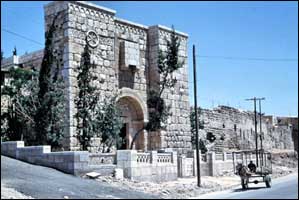
St. Paul's Gate in Damascus, Syria. |
| |
Saul
lodged at a house in Damascus, Syria, for 3 days until his
sight was restored and he was baptized.
After
his baptism, he immediately began to preach that Joshua
of Nazareth is the Son of Elohim.
|
|
|

The street called Straight. |
After
3 days in Damascus, a disciple of Christ named Ananias was sent to restore
sight to Saul. At first, Ananias was very reluctant to meet this zealous
persecutor of Christians:
But
Adonai said unto him, Go thy way: for he is a chosen vessel unto me,
to bear my name before the nations,
and kings, and the children of Israel (Acts 9:15).
Like
Moses of old, who was sent to Pharaoh (a type of Satan) to demand the
release of the children of Israel, so the newly converted Paul was sent
to the entire world to proclaim liberty from the bondage of Satan:
Whereupon,
O king Agrippa, I was not disobedient unto the heavenly vision: But
shewed first unto them of Damascus, and at Jerusalem, and throughout
all the coasts of Judaea, and then to the nations,
that they should repent and turn to Elohim,
and do works meet for repentance (Acts 26:20).
Here
is that same verse from the Douay-Rheims Version:
But
to them first that are at Damascus and at Jerusalem, and unto all
the country of Judea, and to the Gentiles
did I preach, that they should do penance
and turn to God, doing works worthy of penance
(Acts 26:20, Douay-Rheims Version).
This
is a gross DISTORTION of the Heavenly Gospel that Paul preached....Penance
(Lat. paenitentiam) has to do with saving your own soul by good works
or deeds of charity.
Saint
Paul reiterated over and over in his writings that salvation was by
faith in the Risen Messiah . . . and not by good works:
For
by grace are ye saved through faith; and that not of yourselves: it
is the gift of God: Not of works, that no man may glory
(Ephesians 2:8-9. Douay-Rheims Version).
Not
by works of righteousness which we have done, but according to his
mercy he saved us, by the washing of regeneration, and renewing of
the Holy Spirit (Titus 3:5).
Paul
wrote over 30% of the New Covenant and his constant theme was salvation
by FAITH in the Resurrected Messiah.
Saint
Paul established true Christianity at Roma
As
the divinely ordained Apostle to the nations, Saint Paul established
true Christianity at Roma. He arrived there as a prisoner of Caesar
around 60 A.D., and spent 2 years evangelizing that city.
The
great Apostle's motto was not to build upon another man's foundation:
And
so I have made it my aim to preach the gospel, not where Christ was
named, lest I should build on another man’s foundation
(Romans 15:20).
Saint
Paul was a pioneer and trailblazer and this one verse totally
demolishes the myth that Saint Peter was ever at Roma.
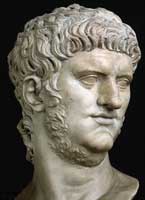
Emperor Nero (37–68
AD).
Emperor from 54 to 68 AD. |
| |
Saint
Paul established true Christianity at Roma.
Saint
Peter never set foot inside the Imperial City.
When Saint Paul had finished the Christian race he was assumed up into heaven! |
|
|
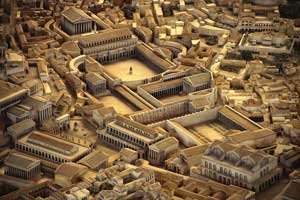
Imperial
Roma circa 68 AD. |
Everywhere
he went, Saint Paul appointed bishops or presbyters over the Congregations
. . . except at Roma....This precluded the Papacy later claiming Apostolic
Succession back to Saint Paul.
After
his aquittal by Nero, Paul preached the Gospel in Spain and Britannia
before his second arrest and trial before Nero.
Saint
Paul was like a burning bush on fire for his Messiah as he
established Christianity throughout the Roman Empire. Besides Roma,
here are just 3 of the places that he established Christian Congregations:
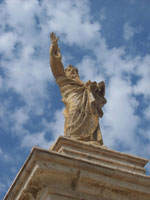
Statue of St. Paul on
St. Paul's Island, Malta. |
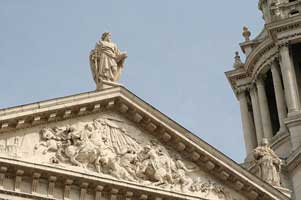
Statue of St. Paul atop St. Paul's Cathedral, London.
|
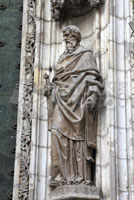
Statue of St. Paul at Seville
Cathedral, Spain. |
The
Book of Acts ends abruptly with Saint Paul at Rome and it is very
probable that the last chapters were deliberately destroyed....In
his Epistle to the Romans, written about 55 A.D., he declared his
desire to preach the Gospel in Spain and that he would stop in Rome
on his way to that country:
Therefore,
when I have performed this and have sealed to them this fruit, I shall
come to see you on my way to Spain
(Romans 15:28).
Así que, cuando haya
concluido esto, y les haya entregado este fruto, pasaré entre vosotros
rumbo a España (Romanos
15:28).
In
55 AD, Paul never imagined that he would be brought to Rome courtesy
of the Roman government. Tradition says that Paul also preached the
Gospel in Britannia before his second arrest and trial before Nero.
Saint
Paul predicted the Great Roman Apostasy!!
Moses
predicted that Israel would forsake JEHOVAH and serve other gods, likewise,
Saint Paul predicted a Great Apostasy from the heavenly Gospel that
he preached:
Take
heed therefore unto yourselves, and to all the flock, over the which
the Holy Spirit hath made you bishops,
to feed the congregation of God, which he hath purchased with his
own blood. For I know this, that after my departing shall grievous
wolves enter in among you, not sparing the flock. Also of your
own selves shall men arise, speaking perverse
things, to draw away disciples after them. Therefore watch,
and remember, that by the space of three years I ceased not to warn
every one night and day with tears (Acts 20:28-31).
Saint
Paul appointed bishops and presbyters (elders) to be over the various
Christian Congregations:
And
when they had ordained them presbyters
in every Congregation, and had prayed with fasting, they commended
them to the Lord, on whom they believed (Acts
14:23).
The
English language Douay-Rheims translation changed presbyters to priests....The
New Covenant uses bishop, presbyter and elder interchangeably, but it
never uses the word PRIEST to refer to any office in the Christian
Congregation:
And
when they had ordained to them priests
in every church and had prayed with fasting, they commended them to
the Lord, in whom they believed (Acts 14:22, Douay-Rheims
Version).
The
pagans were already very familiar with priests (Lat. sacerdotes)....A
priest of Zeus mistook Barnabas and Paul for Zeus and Hermes and tried
to offer a sacrifice to them:
Now
when the people saw what Paul had done, they raised their voices,
saying in the Lycaonian language, The gods have come down to us in
the likeness of men! And Barnabas they called Zeus, and Paul, Hermes,
because he was the chief speaker. Then the priest
of Zeus (sacerdos quoque Iovis), whose
temple was in front of their city, brought oxen and garlands to the
gates, intending to sacrifice with the multitudes
(Acts 14:11-13).
According
to Saint Paul, this Great Apostasy was to culminate in a Man of Sin
sitting in the Temple of God and calling himself God:
Let
no man deceive you by any means: for that day shall not come, except
the apostasy should come first, and that man of sin be revealed,
the son of perdition; Who opposeth and exalteth himself above all
that is called God, or that is worshipped; so that he as God sitteth
in the temple of God, showing himself that he is God (II
Thessalonians 2:3-4).
Jerome
used discessio which just means departing in Latin
and the English language Douay-Rheims Version uses REVOLT:
Let
no man deceive you by any means: for unless
there come a revolt first, and the man of sin be revealed,
the son of perdition. (Latin Vulgate Version).
About
300 years after Saint Paul received the crown of martyrdom and went
to reign with Christ in Heaven, his prophecies began to be fulfilled.
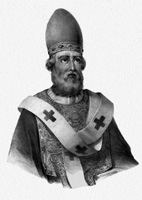
Pope Damasus I (305–384).
Pope from 366 to 384. |
| |
The
Great Apostasy began with Emperor Jesus Constantine and
was completed by Pope Damasus and the Latin Vulgate Version.
The
Vulgate changed the divine name of Joshua of Nazareth and
also Saint Paul's heavenly Gospel of salvation by faith
in the Risen Messiah. |
|
|
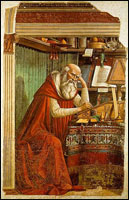
Latin Vulgate Jerome
(340– 420). |
The Holy Bible ends with a warning not to make any changes whatsoever:
For I testify to every one that heareth the words of the prophecy of this book: If any man shall add to these things, God shall add unto him the plagues that are written in this book. And if any man shall take away from the words of the book of this prophecy, God shall take away his part out of the book of life, and out of the holy city, and from these things that are written in this book (Apocalypse 22:18-19, Douay-Rheims Version).
That warning is even found unchanged in the corrupt Latin Vulgate Version!
Vital
Link
Copyright
© 2022 by Patrick Scrivener
|












